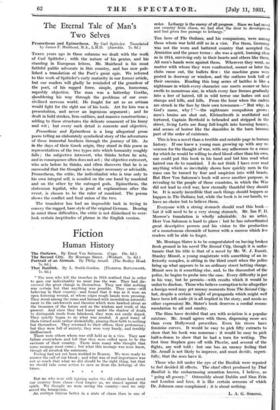The Eternal Tale of Man's Two Selves
Prometheus and Eplmetheus. By Carl Spitteler. Translated by James F. Muirhead, M.A., L.H.D. (Jarrolds. 7s. 6d.) THREE years ago in these columns we dealt with the Work of Carl Spitteler ; with the nature of his genius, and his standing in European letters. Mr. Muirhead is his most faithful public advocate in this country, and has now pub- lished a translation of the Poet's great epic. We referred to this work of Spitteler's early maturity in our former article, but our readers will gladly be reminded of the grandeur of the poet, of his rugged force, simple, grim, humorous, superbly objective. The man was a latterday Goethe, ahouldering his way through the problems of our over- civilized nervous world. - He fought for art as an artizan would fight for the right use of his tools. Art for him was a presentation, and never an ingenious argument ; and he dealt in bold strokes, firm outlines, and massive constructions ; adding to these structures the delicate ornament of his fancy and wit ; but every such detail is concrete and objective.
Prometheits and Bpintetheus is a long allegorical prose poem telling an elaborately symbolical story of the adventures of those immortal brothers through the journey of life. As in -the days of their Greek origin, they stand in this poem as representatives of the two types into which humanity roughly falls ; the subjective introvert, who thinks before he acts, and in consequence often does notact ; the objective extrovert, who acts before he thinks, and often discovers that he is so successful that the thought is no longer necessary or advisable. Prometheus, the critic, the individualist who is true only to his own integral self, is assailed on the one hand by_mankind and on the other by the outraged gods. _ Epimetheus, the statesman legalist, who is good at explanations after the event, is chosen to be the ruler of mankind. The poems
shows the conflict and final union of the two. - .
The translator has had an impossible task in trying to convey the rugged, bare style of the original German. Bearing in mind these difficulties, the critic is not disinclined to over- look certain ineptitudes of phrase in the English version.


































 Previous page
Previous page